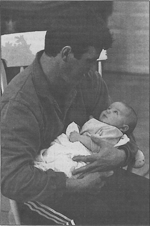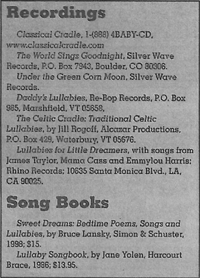
Songs of Love
Bedtime lullabies sooth baby and parent
By LAURIE D. MORRISSEY
Hush, little baby, don't say a word. Papa's gonna buy you a mockingbird.
Chances are, someone sang these words to you when you were a child. Or maybe it was “Twinkle, Twinkle,” or the lulling phrases of “Brahms' Lullaby.” We all remember at least a few times of the songs that were sung to us at bedtime. Whatever the song, the message was the same: “Go to sleep. You are loved; you are safe; you are not alone.”
The practice of singing a baby a lullaby today seems a bit back-to-basics. It's free; it's homemade; and it's been around as long as there have been parents and babies. “Every culture has cradle songs that are used to calm the baby,” says Alice Sterling Honig, Ph.Dd, a child-development specialist at Syracuse University. “You're telling her in a snuggly, cuddly, focused way, through music, that you care about her.”

According to Honig, it is the act of singing that matters, not the meaning of the lyrics or the talent of the singer. “You don't have to sing well. What matters to the baby is that it's your voice. And it doesn't matter what words you sing. You can alternate remembered lyrics like 'hush, little baby' or 'lullaby and goodnight' with your own made-up words or even nonsense words. The message of love gets through.”
Bedtime and naptime are especially important times to send that message. “That twilight time between being awake and asleep is very special,” says preschool teacher Susan Hagner. “It's the transition between being with Mom or Dad and being alone and asleep. Children are very vulnerable at this time. There are fears associated with nighttime, and they have to let down their guard. It's important to give lots of contact to make them feel secure.”
Singing the baby to sleep has benefits for the singer, too. It's a time to slow down and relax, to recover from a busy day and re-energize for the next. It makes you feel good.
The bedtime song can also help promote language awareness. Research indicates that reading aloud and talking to babies stimulates their intellectual and language abilities. Singing works the same way. “The melody motivates babies to imitate the words,” says Hagner. “They want to join in.”
Bedtime songs also provide early exposure to music. “Singing to babies puts them in touch with music so that they'll always be comfortable with it,” says music educator Janet Silburn. “Lullabies work well because bedtime is particularly free of distraction. The song is the focus.” Silburn adds that lullabies also show kids they can make music themselves. “They're saying, 'Here is music that you can make with your own mind, your own voice, your own body. You don't need a symphony orchestra or a cassette or a guitar.'”
Another valuable aspect of the lullaby is its ability to strengthen family ties. Honig, who is also a folk singer, calls the lullaby “a magical, wonderful glue to bind families. Sometimes a family's lullabies aren't lullabies at all, just songs they sing at bedtime because they like them and know them so well. The songs get passed along as cradle song and become part of that family's tradition. Keeping these traditions alive promotes a sense of family of continuity, of belonging--things that are especially important in this fragmented, do-your-own-thing world.”
Few parents and caregivers would disagree that crooning to baby at bedtime is a good thing, but we can't be there every time our babies go to sleep. Fortunately, a wealth of recorded bedtime music is available. The collections range from traditional to classical to New Age; vocal and instrumental. One unique recording, Daddy's Lullabies, features lullabies sung by fathers, as well as a daddy/daughter duet.
Among the excellent CDs available are The World Sings Goodnight I and II, produced by musician Tom Wasinger. More than 30 cultures are represented, from Brazil to Bali. Wasinger also produced a collection of lullabies from Native American cultures, called Under the Green Corn Moon.
Now a father of two, Wasinger says his interest began before becoming a parent, because the lullaby is an essential folk music form. “Wherever I went, people could sing me a lullaby in their language,” he says. The lyrics he found ranged from serious to playful, and included themes that were humorous, plaintive, teasing and even political. In a lullaby from Indonesia, a mother pleads with her infant son: “Sleep and grow up well, honey, so that you can protect me later, because you father has gone away and forgotten you.” In a French lullaby, the singer teases: “Go to sleep, my child, to the sound of the clarinet; to wake you up we'll cut off your ears!” A song from Bolivia mourns the plight of poor children on the streets of San Juan.
After spending two years gathering lullabies, and many evening singing his son and daughter to sleep, Wasinger has discovered the lullaby's other essential qualities. “The lullaby serves a purpose that borders on survival. If the baby doesn't sleep, you don't sleep, and then you aren't going to have enough energy to do what you have to do the next day,” he says.

As readily available as recordings are, early-childhood experts caution against relying on them too much. Silburn feels that the best use for lullaby recordings is for parents to learn the songs themselves. “A recording is limited in what it can offer,” she says. “There's no opportunity to speed it up, slow it down or change the mood of it, like there is with your own voice.”
Singing quietly to your baby at the close of the day is an experience to treasure, especially in a world of busy schedules and frequent separations. Whether we hum our favorite traditional tunes, croon the words of our grandmothers, or make up our own soothing nonsense, we are strengthening the bond that defines and supports our families.








